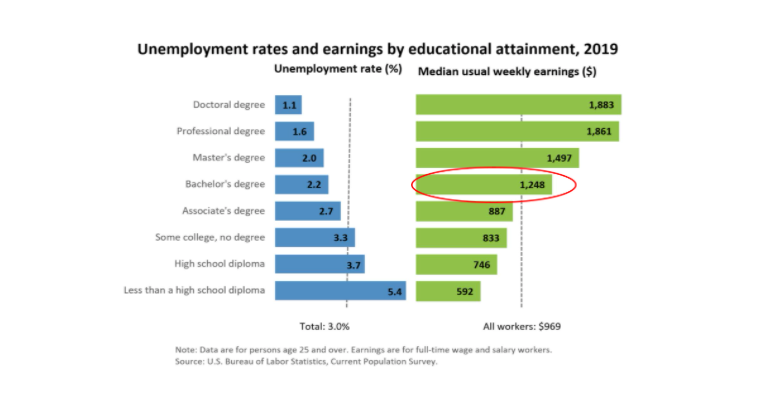Why pursue higher education?
i Here is an explanation on diploma, certificates, and degrees:
Certificate
Number of units required varies. All related to a particular occupational skill. Sole objective is immediate employment. Offered by community colleges. Example (Automotive, cosmetology, dental hygiene, etc). You will find private companies that also offer these but I recommend you stay away as they are many time for profit which means extremely expensive and sometimes not accredited.
Associate’s Degree
General Education Courses & Electives. 60 units required. Usually referred to as A.A. or A.S. (Associate of Arts or Science) Degrees. Normally requires two years or four semesters of full- time courses. Offered by community colleges. Many times students at a community college take general education courses to be ready to transfer but this is highly recommended as it is considered a degree.
Bachelor’s Degree
Major Courses PLUS General Education & Minor or Electives, 124–132 total units required. Usually referred to as B.S. or B.A. (Bachelor of Science or Arts) Degrees. Normally requires four years of full-time course work. You may complete the first two years at a community college and then transfer to a four-year university.
Master’s Degree
Bachelor Degree PLUS graduate courses in specialized area. Bachelor’s Degree units (124–132) PLUS about 36 units. Usually referred to as M.S. or M.A. (Master of Science or Arts) Degrees. Normally requires two additional years full-time work AFTER completion of Bachelor’s Degree.
Doctorate Degree
Master’s Degree PLUS advanced graduate courses in specialized area. Units vary, depending on field of study. Usually referred to as Ph.D. or Ed.D. (Doctor of Philosophy or Doctor of Education). Normally requires three to five additional years of full-time work AFTER completion of Master’s Degree. Thesis required.
Certificate
Number of units required varies. All related to a particular occupational skill. Sole objective is immediate employment. Offered by community colleges. Example (Automotive, cosmetology, dental hygiene, etc). You will find private companies that also offer these but I recommend you stay away as they are many time for profit which means extremely expensive and sometimes not accredited.
Associate’s Degree
General Education Courses & Electives. 60 units required. Usually referred to as A.A. or A.S. (Associate of Arts or Science) Degrees. Normally requires two years or four semesters of full- time courses. Offered by community colleges. Many times students at a community college take general education courses to be ready to transfer but this is highly recommended as it is considered a degree.
Bachelor’s Degree
Major Courses PLUS General Education & Minor or Electives, 124–132 total units required. Usually referred to as B.S. or B.A. (Bachelor of Science or Arts) Degrees. Normally requires four years of full-time course work. You may complete the first two years at a community college and then transfer to a four-year university.
Master’s Degree
Bachelor Degree PLUS graduate courses in specialized area. Bachelor’s Degree units (124–132) PLUS about 36 units. Usually referred to as M.S. or M.A. (Master of Science or Arts) Degrees. Normally requires two additional years full-time work AFTER completion of Bachelor’s Degree.
Doctorate Degree
Master’s Degree PLUS advanced graduate courses in specialized area. Units vary, depending on field of study. Usually referred to as Ph.D. or Ed.D. (Doctor of Philosophy or Doctor of Education). Normally requires three to five additional years of full-time work AFTER completion of Master’s Degree. Thesis required.
